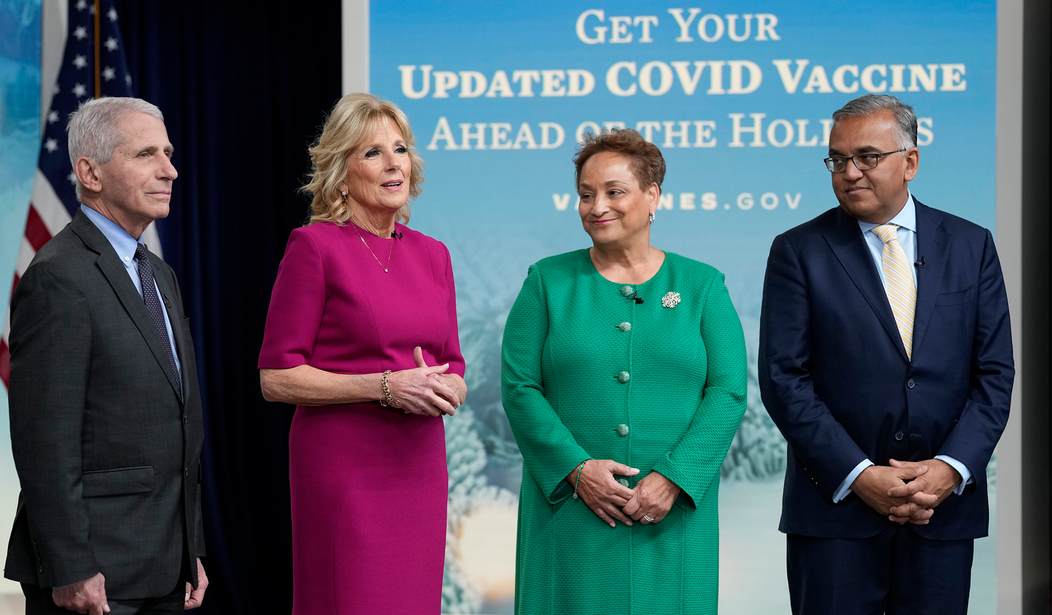COVID-19 has found itself quickly back in the news and just in time for the 2024 presidential election. The Biden administration, from White House Press Secretary Karine Jean-Pierre to the Centers for Disease Control and Prevention (CDC), has been hyping the matter. President Joe Biden has called for Congress to fund yet another booster, and mask mandates have come back to movie studios, colleges and universities, and even elementary schools. When First Lady Jill Biden tested positive for COVID earlier this month, the president was supposed to be following masking requirements, in accordance with his own CDC. At least, that's what Jean-Pierre told us. Not only did Biden not exactly keep to that, he also joked about it.
In contrast, is the Republican Party, with Gov. Ron DeSantis (R-FL) at the forefront of the issue as he continues to crack down on COVID lockdowns and mandates in Florida as well as campaign on how he'll handle it at the federal level. DeSantis is currently in second place in the presidential primary behind former and potentially future President Donald Trump. Who handled COVID and how has been a main point of contention between the two candidates, especially lately.
Amidst such a political landscape, questions on COVID are once more finding themselves in polls. The most recent poll from the Economist/YouGov included questions about COVID, including whether respondents have gotten or will get a booster in 2023 and if they feared contracting COVID.
A small plurality of registered voters, 31 percent, say they're "not too worried" about personally experiencing COVID, but this is statistically tied with the 30 percent who say they are "not worried at all." Twenty-six percent of voters say they're "somewhat worried." Just 13 percent of voters say they're "very worried," which is the same for respondents overall, as well.
Most respondents, at 72 percent, and most voters, at 81 percent, have received at least one vaccine against COVID. A write-up for the poll, however, noted that "[d]ifferences in reported COVID-19 vaccination by party are significant: 81% of Democrats and 69% of Republicans have received at least one shot."
Recommended
The poll was conducted just after yet another COVID booster had been approved, a move which some health experts, such as Florida Surgeon General Dr. Joseph Ladapo, had expressed concerns about being too hastily done.
When it comes to the latest booster, a plurality of total respondents (39 percent) say they're not getting it, while 36 percent say they've already gotten it (1 percent) or want to get it (35 percent). That only 36 percent of adults want the booster or already got it, leads the poll's write-up to suggest that it's "possibly in part because some may not be eligible for it," though another unmentioned likely factor could be because Americans might be tired of the never-ending amount of boosters that they're told to take.
The only demographics where a majority say they will get the booster include 67 percent of Biden voters, 59 percent of Democrats, and 64 percent of liberals.
Perhaps most telling the future of how endemic COVID has become is how many respondents say they think that they'll ever receive a COVID vaccine for years following 2023. A slight plurality of overall respondents and voters (28 percent for each) say they will "definitely not" receive one. That could certainly put a damper on the Biden administration's hopes for Americans to be expected to comply with getting more vaccines.
A partisan divide was particularly sharp here, as a plurality of Biden voters (42 percent) say they "definitely" will receive one, but a majority of Trump voters (50 percent) say they will "definitely not." A slight plurality of Democrats (35 percent) say they "definitely" will receive more COVID vaccines. A slight plurality of Independents (32 percent) and a near majority of Republicans (47 percent) say they will "definitely not."
For how much more eager Democrats are to take yet another booster, the findings about how they're more concerned about getting COVID than Republicans suggest they might not be entirely confident in those vaccines. It doesn't inspire much confidence overall, in fact.
When it comes to the partisan breakdown of the numbers mentioned above about those who worry about experiencing COVID, a plurality of Biden voters (37 percent), Democrats (38 percent), and liberals (40 percent) say they're "somewhat worried" about it.
When it comes to the latest poll from The Economist/YouGov, which includes questions on COVID boosters, it’s certainly something that Democrats are most likely to want the latest booster, but also worry more about getting COVID. Do they not trust the vaccines? 🤷♀️💉 pic.twitter.com/EW08nx7uui
— Rebecca Downs (@RebeccaRoseGold) September 14, 2023
Polling from CBS News/YouGov, conducted shortly before the latest booster was approved, similarly found that just 43 percent of respondents are looking to get the new booster, while 57 percent are not. Partisan politics again plays a role, as 73 percent of Democrats say they will, compared to just 37 percent of independents and 21 percent of Republicans.
Further, Americans are becoming increasingly less concerned about variants. In 2021, 58 percent of respondents said they were "concerned" about the Omicron variant. Today, just 48 percent are concerned about variants.
There is less concern specifically about new variants today than there was about the Omicron variant as it was emerging in late 2021. pic.twitter.com/vOVYuRDoMX
— CBS News Poll (@CBSNewsPoll) September 12, 2023
As a write-up from CBS News pointed out, "the nation voices less concern than it ever has since the start of the pandemic," as 45 percent express a concern about themselves or a family member getting COVID. The height was 77 percent, who said so in April 2020.
That CBS/YouGov poll was conducted September 5-8 with 2,335 adults and a margin of error of plus or minus 2.7 percentage points.
Regarding other COVID measures being pushed, 76 percent of total respondents in The Economist/YouGov poll, including 75 percent of voters, say they "never" wear a facemask outside their home. This includes 66 percent of Biden voters, 61 percent of Democrats, 62 percent of liberals and 82 percent of respondents over 65 years of age who say they "never" do so.
Among those most likely to say they "always" wear a face mask outside of the home, 23 percent of black respondents, 10 percent of Hispanics, 8 percent of Biden voters, 12 percent of Democrats, and 11 percent of liberals.
The Economist/YouGov poll was conducted September 10-12 with 1,500 adults, including 1,334 voters, for whom there was a margin of error of plus or minus 3 percentage points.























